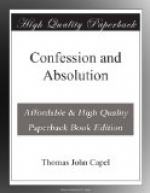Notwithstanding these clear utterances in Convocation, young curates and vicars took to themselves authority, and began to hear confession and pronounce absolution. These gentlemen had never been prepared for the work: in their course of ecclesiastical studies the hearing of confessions and the absolving from sin were never contemplated; they had to obtain their knowledge from the manuals in use among Catholic priests. Their bishops neither would nor could give them authority; and so these clergymen became an authority to themselves, and declared they had power to forgive sin, merely because they were ordained priests. Such a pretension could not be made by any priest or bishop of the Catholic Church, however valid may be his orders. To the sacramental power of orders must be added juridical authority to absolve. This, in the divine economy, as will be shown later, is the means whereby the exercise of such a power can be duly controlled.
Such was the movement in England. I find it transported to the United States. And I am told by honorable trustworthy people that in Boston, New York, Baltimore, Philadelphia, and other cities, there are Episcopalian clergymen who insist that their penitents shall confess at regular intervals.[54] That such a fact is possible, or that persons should be found ready to submit themselves to such a self-asserted ministry, is simply incredible in face of the clear declaration of the Thirty-nine Articles, the official commentary of the Book of Homilies cited above, the formal condemnation of the English bishops, and the intentional omission of the only two passages referring to confession from the Book of Common Prayer used in America.
In the United States it is the more inexplicable, inasmuch as by the Declaration of Independence there could be no jurisdiction derived from the Crown of England. And, consequently, the Episcopal Church, formed as it was after the Independence, could not, from the nature of the case, receive jurisdiction from without. It formed itself into a corporation, and its only authority was generated by itself. But that of confessing and absolving from sin could not have been so created: no more than it could have been done by the Episcopal Methodist, the Presbyterian, the Quaker, or any other religions corporation.




